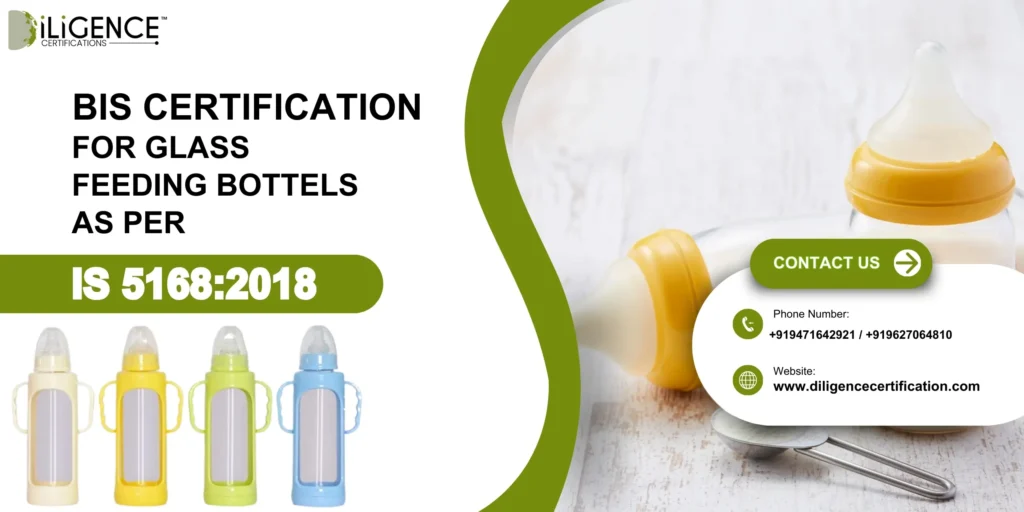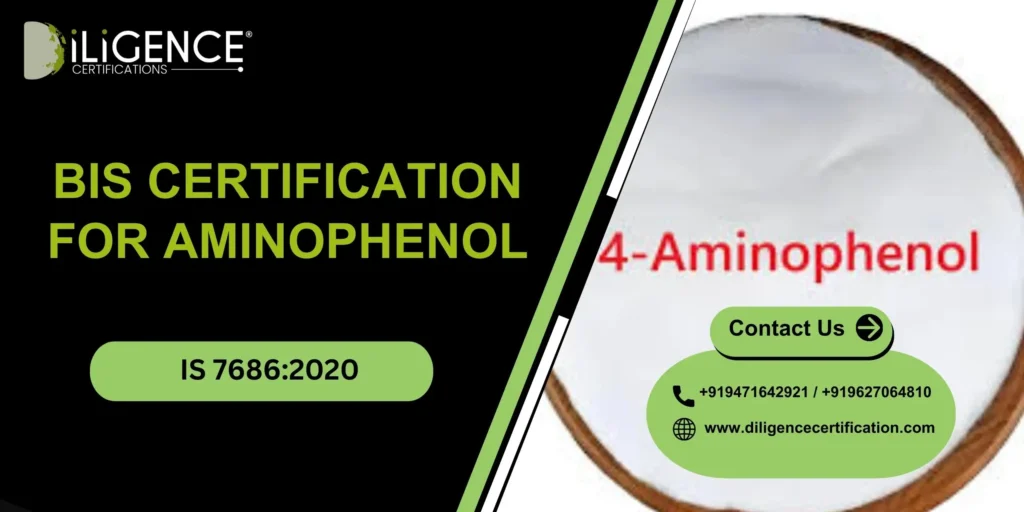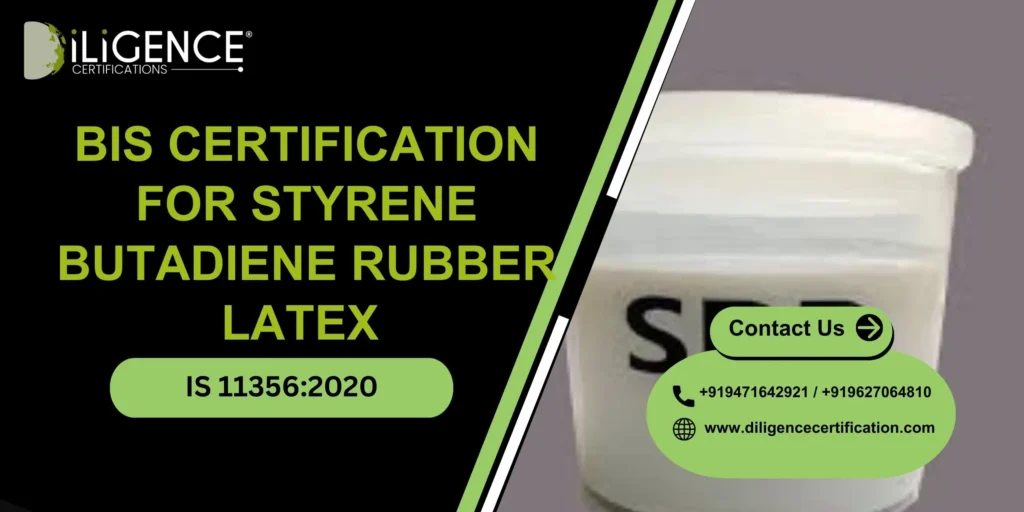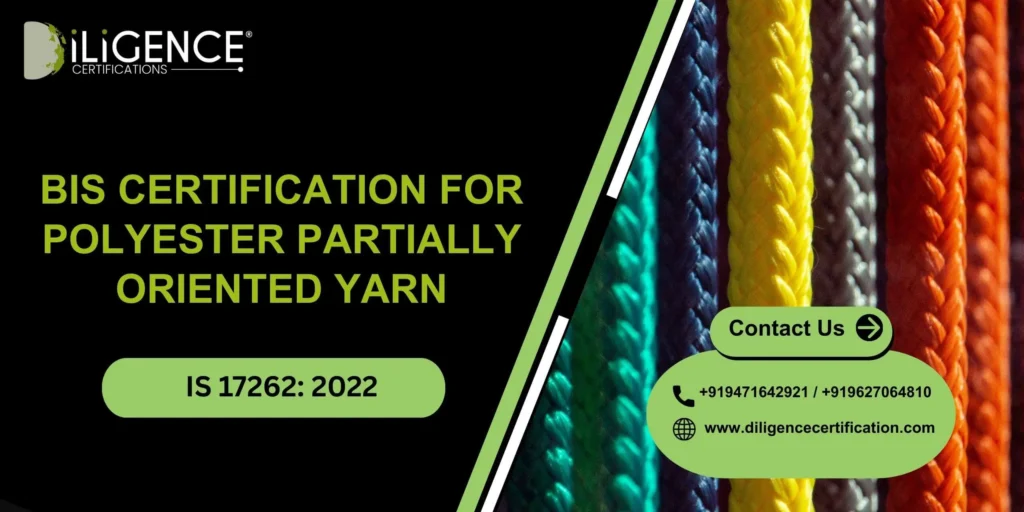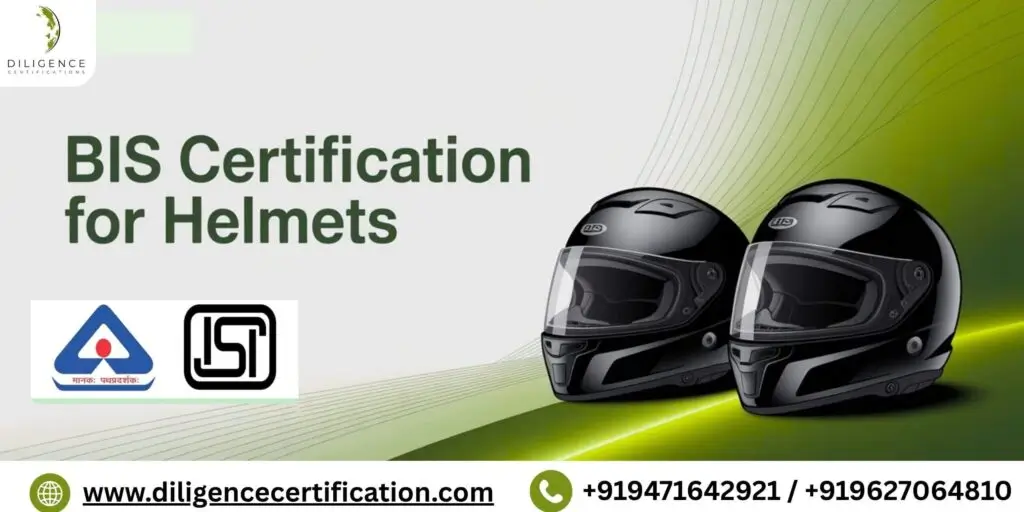- BIS for glass feeding bottles to have BIS certification in India. BIS is a certification to show conformity to safety and quality standards according to IS 5168:2022.
- Bureau of Indian Standards Certification on glass feeding bottles is a mandatory requirement under the Indian Standards Institute (ISI).
- This certification is required for both domestic manufacturing and foreign importation for sale of glass feeding bottles in the Indian market.
Introduction

Bureau of Indian Standards (BIS), BIS Certification of Glass feeding Bottles is mandatory for all producers and importers. BIS Certification is a quality measure or indicator, as a mark that glass feeding bottles meet the relevant Indian Standards, IS 5168.
BIS Certification gives our customers visibility on the assurance that provides an extra level of protection for infant health and safety. It is vital for producers or consumers to fully appreciate the process, requirements, and meaning of BIS certification of the glass feeding bottles.
What is BIS for Glass Feeding Bottles?
BIS Certification is a quality acceptance certification with the Bureau of Indian Standards (BIS) for glass feeding bottles and is mandatory by law. BIS Certification is a declaration that glass feeding bottles conform and meet the Indian Standard IS 5168.
The Indian Standard IS 5168 addresses the safety, performance and hygiene requirements for feeding bottles intended for infants and children.
Why BIS Certification Matters for Glass Feeding Bottles?
- Legal Mandate & Framework
- BIS certification under the ISI Mark (Scheme-I) is mandatory for glass feeding bottles to be sold, imported, or distributed in India.
- This requirement is enforceable by the BIS Act and associated Quality Control Orders.
- Consumer Safety & Trust
- Certification means that the bottles are safe, long-lasting, hygienic and sterilisation safe for the health of infants as consumers.
- The ISI mark provides market credibility and consumer trust.
- Market Access & Brand Positioning
- BIS certification is necessary for access to e-commerce platforms, B2B channels, exports, and modern retail.
- It serves as a competitive differentiator and reinforces quality branding.
Understanding IS 5168:2018

- Scope & Applicability:- Specifies the requirements for glass feeding bottles; teats, plastic lids, or rubber accessories are not included.
- Key Safety & Performance Requirements
- Material: High quality, sterilizable borosilicate or soda lime glass.
- Thermal Shock Resistance: Safe for boiling and repeated sterilization.
- Mechanical Strength: Impact resistance to prevent breakage.
- Volume Markings: Clear, accurate graduation marks.
- Finish and Hygiene: For smooth, crack free surfaces; non-toxic finishes; easy to clean.
- Chemical Safety: Tests for heavy metal migration, alkali limits.
- Labeling: Must include ISI mark, manufacturer, capacity, batch info, etc.
Why BIS Certification Mandatory for Glass Feeding Bottles?
Bureau of Indian Standards certification is mandatory for glass feeding bottles in India primarily to protect and promote the safety, health, and well-being of infants. Here is the breakdown as to why it is required.
Health and Safety Considerations for Infants
- Infants are particularly vulnerable due to their developing immune and digestive systems. Any hazardous material in feeding bottles may create harmful health conditions.
Dangerous quality of glass
- Collectively, poor quality glass may easily break, leak chemicals, or have sharp edges which may pose a choking risk or injury.
Conformity to Indian Standards (IS 5168)
- Glass feeding bottles must comply with IS 5168:2018 which lays down.
- Material quality
- Thermal shock resistance
- Chemical resistance
- Structural integrity
- BIS ensures that bottles meet these rigorous technical and safety specifications before reaching the market.
Legal Requirement under QCO
- The QCO is an order from the Ministry of Commerce and Industry, Government of India, that requires BIS certification before certification can be issued for glass feeding bottles and various other products.
Consumer Confidence
- The ISI marks on the product highlight to consumers that these products are safe and reliable products due to the BIS certification.
- It creates trust with parents as they always require quality assurance when choosing products for their baby.
Prevents Cheap, Unsafe Imports
- It reduces the flow of inferior quality imports that may not be compliant with Indian safety standards.
- It ensures that any Indian manufacturer that is compliant to appropriate standards will compete on a level playing field.
Step-by-Step BIS Certification Process
- Online Application:-Register and submit product/factory details via the Manakonline portal.Include manufacturing, QC, process flows, and design specs.
- Testing in BIS-Approved Labs:- Submit samples for tests: thermal shock, impact, calibration, chemical safety, graduation accuracy.
- Factory Inspection:- BIS assesses facilities, QC systems, traceability, equipment, and cleanliness.
- License Approval:- Upon compliance, receive BIS license (CM/L), enabling use of ISI mark with IS 5168:2018.

Benefits of BIS Certification for Glass Feeding
BIS Certification for glass feeding bottles provides many benefits to manufacturers, consumers, and oversight bodies as well. Below are the main benefits.
- Ensures Safety and Quality: BIS certification indicates that glass feeding bottles attain acceptable levels of safety and quality for safety reasons acceptable according to the standards of the Indian Standards Institute to limit infant exposure to hazardous materials.
- Builds Consumer Trust: Since it is essential for parents to know that they are using a well-tested product, they trust BIS certification as an accredited mark of trust. This increases brand trustworthiness and consumer trust.
- Regulatory Compliance: BIS certification is required for certain baby products, including glass feeding bottles, for marketable use as specified in the rules from Government India Statutes.
- Reduced Health Risks: Certified products are without hazardous materials such as lead, BPA, or other harmful chemicals, for a safe feeding area for infants.
- Competitive Advantage: Manufacturers and sellers of BIS certified products have a market advantage as compared to selling certified but not BIS regulated or imported items not certified by the BIS.
- Legal Protection: Utilizing BIS standards protects business from legal action, penalties, recall, or prevention of their product from reaching the market.
- Export Opportunities:- BIS certification helps Indian producers and manufacturers accept international standards therefore aiding trade internationally.
Key Highlights
| Non-Toxic | Made from BPA-free, lead-free, heat resistance glass |
| BIS Verified | as per IS 5168 : 2022 standards |
| Baby-safe | No leaching chemicals, safe for infants |
| High Temperature Resistance | Suitable for boiling & sterilizing |
| Attractive | Scratch-resistant, durable |
| Hygienic | Easy to clean & free from odors |
| Environment-Friendly | Reusable & recyclable |
| Smart Design | anti-colic nipples & clear markings |
Required Documentation
- Existing BIS License– Copy of current valid license
- Internal Test Reports– As per IS 5168:2022 (recent, within 3 months)
- Production & Sales Data– Under the ISI mark during current validity period
- Factory Details– Any changes in address, equipment, or staff
- Self-Declaration– Of continued compliance to standards
- Authorization– Letter for authorized signatory (if applicable)
Timelines, Costs, Validity & Renewal
- Timelines
- Domestic: Approximately 30 days.
- Foreign: Around 180 days.
- Cost Of BIS Certification for Glass Feeding Bottles
| Application Fee | Charges for submitting the BIS certification. |
| Testing Charges | Fees for testing product samples in BISrecognized laboratories. |
| Audit Fee | Cost for factory inspection by BIS officials. |
| License Fee | Fee for grant of BIS license. |
| Marking Fee | Annual fee based on the production volume for using the ISI mark. |
- Validity
- These are usually valid for 1 – 2 years, with an option to renew for up to 5 years, with audits and fees.
- Renewal
- The certificate must be renewed annually.
- Renewal application should be submitted before the expiry date to avoid any lapse.
Why BIS Truly Matters For All Stakeholders?
- Manufacturers:- Legal compliance, brand reputation, market expansion, liability protection.
- Importers & OEMs:- Ensures products meet Indian safety standards, avoids legal bottlenecks.
- Consumers:- Assured product safety, chemical-free feeding solutions, and accurate feeds.
Why Choose Diligence Certification?
- Globally Recognized – Trusted certification accepted internationally.
- Experienced Auditors – Skilled professionals with industry expertise.
- Fast & Efficient Process – Timely and smooth certification procedures.
- Customized Solutions – Services created for your organizational custom requirements.
- Open-book Pricing – No surprise or additional cost.
- Strong Ethics & Integrity – Services that are fair, impartial, and unquestionable.
- Total Support – Services that support you before certification, during certification, and after certification.
- Credibility Boost – Build trust from clients, partners, and regulators.
- Training & Awareness Programs – better compliance and competence.
- Global Presence with Local Expertise – Providing services internationally with local knowledge.
Conclusion
BIS certification for glass feeding bottles demonstrates that they follow safety and quality standards. It safeguards infants from unsafe materials, which supplies safe feeding practices. IS 5168:2022 is a required standard for making and selling glass feeding bottles in India. BIS certification provides consumers with confidence in the product. It supports regulatory action by certifying that the bottle follows various regulations.
Frequenlty Asked Questions
Is BIS Certification a requirement for glass feeding bottles?
Yes, BIS Certification must be obtained for WELL, IS 5168:2021, before selling in India.
Which standard applies to glass feeding bottles?
Glass feeding bottles must comply with IS 5168:2021.
Who is required to obtain BIS Certification?
All manufacturers (National and Foreign, through an Authorized Indian Representative).
What are the advantages of having BIS Certification?
Safety, quality assured, ability to use ISI mark, and access to the market legally.
What documents are required?
A business license, manufacturing process, test reports, quality control records, etc.
How long is the certificate valid?
Valid for 2 years and further renewable.
How serious is it to sell products without a BIS Certification?
It will result in penalties, product confiscation and legal action.


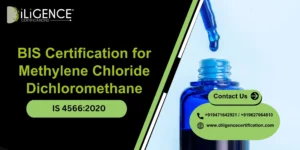
 BIS Certification
BIS Certification
 CDSCO
CDSCO
 CPCB
CPCB
 LMPC
LMPC
 WPC Approval
WPC Approval
 Global Approvals
Global Approvals
 TEC
TEC
 ARAI
ARAI
 BEE
BEE
 ISO Certification
ISO Certification
 Drone Registration
Drone Registration
 NOC For Steel
NOC For Steel



















 Business Registration
Business Registration














 Legal Services
Legal Services
 Trademark Registration
Trademark Registration
 Copyright Registration
Copyright Registration
 Patent Registration
Patent Registration
